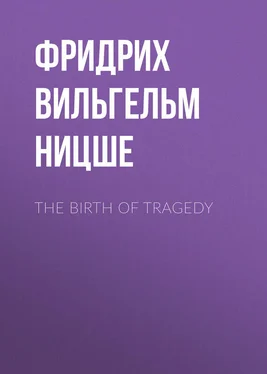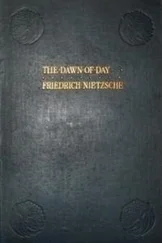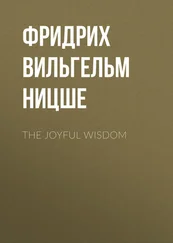Фридрих Ницше - The Birth of Tragedy
Здесь есть возможность читать онлайн «Фридрих Ницше - The Birth of Tragedy» — ознакомительный отрывок электронной книги совершенно бесплатно, а после прочтения отрывка купить полную версию. В некоторых случаях можно слушать аудио, скачать через торрент в формате fb2 и присутствует краткое содержание. Жанр: Философия, literature_19, foreign_antique, foreign_prose, на английском языке. Описание произведения, (предисловие) а так же отзывы посетителей доступны на портале библиотеки ЛибКат.
- Название:The Birth of Tragedy
- Автор:
- Жанр:
- Год:неизвестен
- ISBN:нет данных
- Рейтинг книги:3 / 5. Голосов: 1
-
Избранное:Добавить в избранное
- Отзывы:
-
Ваша оценка:
- 60
- 1
- 2
- 3
- 4
- 5
The Birth of Tragedy: краткое содержание, описание и аннотация
Предлагаем к чтению аннотацию, описание, краткое содержание или предисловие (зависит от того, что написал сам автор книги «The Birth of Tragedy»). Если вы не нашли необходимую информацию о книге — напишите в комментариях, мы постараемся отыскать её.
The Birth of Tragedy — читать онлайн ознакомительный отрывок
Ниже представлен текст книги, разбитый по страницам. Система сохранения места последней прочитанной страницы, позволяет с удобством читать онлайн бесплатно книгу «The Birth of Tragedy», без необходимости каждый раз заново искать на чём Вы остановились. Поставьте закладку, и сможете в любой момент перейти на страницу, на которой закончили чтение.
Интервал:
Закладка:
Let us imagine a rising generation with this undauntedness of vision, with this heroic impulse towards the prodigious, let us imagine the bold step of these dragon-slayers, the proud daring with which they turn their backs on all the effeminate doctrines of optimism, in order "to live resolutely" in the Whole and in the Full: would it not be necessary for the tragic man of this culture, with his self-discipline to earnestness and terror, to desire a new art, the art of metaphysical comfort, tragedy as the Helena belonging to him, and that he should exclaim with Faust:
"Und sollt ich nicht, sehnsüchtigster Gewalt,
In's Leben ziehn die einzigste Gestalt?" 2 2 And shall not I, by mightiest desire, In living shape that sole fair form acquire? SWANWICK, trans. of Faust.
"Would it not be necessary ?" … No, thrice no! ye young romanticists: it would not be necessary! But it is very probable, that things may end thus, that ye may end thus, namely "comforted," as it is written, in spite of all self-discipline to earnestness and terror; metaphysically comforted, in short, as Romanticists are wont to end, as Christians… No! ye should first of all learn the art of earthly comfort, ye should learn to laugh, my young friends, if ye are at all determined to remain pessimists: if so, you will perhaps, as laughing ones, eventually send all metaphysical comfortism to the devil – and metaphysics first of all! Or, to say it in the language of that Dionysian ogre, called Zarathustra :
"Lift up your hearts, my brethren, high, higher! And do not forget your legs! Lift up also your legs, ye good dancers – and better still if ye stand also on your heads!
"This crown of the laughter, this rose-garland crown – I myself have put on this crown; I myself have consecrated my laughter. No one else have I found to-day strong enough for this.
"Zarathustra the dancer, Zarathustra the light one, who beckoneth with his pinions, one ready for flight, beckoning unto all birds, ready and prepared, a blissfully light-spirited one: —
"Zarathustra the soothsayer, Zarathustra the sooth-laugher, no impatient one, no absolute one, one who loveth leaps and side-leaps: I myself have put on this crown!
"This crown of the laughter, this rose-garland crown – to you my brethren do I cast this crown! Laughing have I consecrated: ye higher men, learn, I pray you – to laugh!"
Thus spake Zarathustra , lxxiii. 17, 18, and 20.
SILS-MARIA, OBERENGADIN, August 1886.FOREWORD TO RICHARD WAGNER
In order to keep at a distance all the possible scruples, excitements, and misunderstandings to which the thoughts gathered in this essay will give occasion, considering the peculiar character of our æsthetic publicity, and to be able also Co write the introductory remarks with the same contemplative delight, the impress of which, as the petrifaction of good and elevating hours, it bears on every page, I form a conception of the moment when you, my highly honoured friend, will receive this essay; how you, say after an evening walk in the winter snow, will behold the unbound Prometheus on the title-page, read my name, and be forthwith convinced that, whatever this essay may contain, the author has something earnest and impressive to say, and, moreover, that in all his meditations he communed with you as with one present and could thus write only what befitted your presence. You will thus remember that it was at the same time as your magnificent dissertation on Beethoven originated, viz., amidst the horrors and sublimities of the war which had just then broken out, that I collected myself for these thoughts. But those persons would err, to whom this collection suggests no more perhaps than the antithesis of patriotic excitement and æsthetic revelry, of gallant earnestness and sportive delight. Upon a real perusal of this essay, such readers will, rather to their surprise, discover how earnest is the German problem we have to deal with, which we properly place, as a vortex and turning-point, in the very midst of German hopes. Perhaps, however, this same class of readers will be shocked at seeing an æsthetic problem taken so seriously, especially if they can recognise in art no more than a merry diversion, a readily dispensable court-jester to the "earnestness of existence": as if no one were aware of the real meaning of this confrontation with the "earnestness of existence." These earnest ones may be informed that I am convinced that art is the highest task and the properly metaphysical activity of this life, as it is understood by the man, to whom, as my sublime protagonist on this path, I would now dedicate this essay.
BASEL, end of the year 1871.
THE BIRTH OF TRAGEDY
We shall have gained much for the science of æsthetics, when once we have perceived not only by logical inference, but by the immediate certainty of intuition, that the continuous development of art is bound up with the duplexity of the Apollonian and the Dionysian: in like manner as procreation is dependent on the duality of the sexes, involving perpetual conflicts with only periodically intervening reconciliations. These names we borrow from the Greeks, who disclose to the intelligent observer the profound mysteries of their view of art, not indeed in concepts, but in the impressively clear figures of their world of deities. It is in connection with Apollo and Dionysus, the two art-deities of the Greeks, that we learn that there existed in the Grecian world a wide antithesis, in origin and aims, between the art of the shaper, the Apollonian, and the non-plastic art of music, that of Dionysus: both these so heterogeneous tendencies run parallel to each other, for the most part openly at variance, and continually inciting each other to new and more powerful births, to perpetuate in them the strife of this antithesis, which is but seemingly bridged over by their mutual term "Art"; till at last, by a metaphysical miracle of the Hellenic will, they appear paired with each other, and through this pairing eventually generate the equally Dionysian and Apollonian art-work of Attic tragedy.
In order to bring these two tendencies within closer range, let us conceive them first of all as the separate art-worlds of dreamland and drunkenness; between which physiological phenomena a contrast may be observed analogous to that existing between the Apollonian and the Dionysian. In dreams, according to the conception of Lucretius, the glorious divine figures first appeared to the souls of men, in dreams the great shaper beheld the charming corporeal structure of superhuman beings, and the Hellenic poet, if consulted on the mysteries of poetic inspiration, would likewise have suggested dreams and would have offered an explanation resembling that of Hans Sachs in the Meistersingers: —
Mein Freund, das grad' ist Dichters Werk,
dass er sein Träumen deut' und merk'.
Glaubt mir, des Menschen wahrster Wahn
wird ihm im Traume aufgethan:
all' Dichtkunst und Poeterei
ist nichts als Wahrtraum-Deuterei. 3 3 My friend, just this is poet's task: His dreams to read and to unmask. Trust me, illusion's truths thrice sealed In dream to man will be revealed. All verse-craft and poetisation Is but soothdream interpretation.
The beauteous appearance of the dream-worlds, in the production of which every man is a perfect artist, is the presupposition of all plastic art, and in fact, as we shall see, of an important half of poetry also. We take delight in the immediate apprehension of form; all forms speak to us; there is nothing indifferent, nothing superfluous. But, together with the highest life of this dream-reality we also have, glimmering through it, the sensation of its appearance: such at least is my experience, as to the frequency, ay, normality of which I could adduce many proofs, as also the sayings of the poets. Indeed, the man of philosophic turn has a foreboding that underneath this reality in which we live and have our being, another and altogether different reality lies concealed, and that therefore it is also an appearance; and Schopenhauer actually designates the gift of occasionally regarding men and things as mere phantoms and dream-pictures as the criterion of philosophical ability. Accordingly, the man susceptible to art stands in the same relation to the reality of dreams as the philosopher to the reality of existence; he is a close and willing observer, for from these pictures he reads the meaning of life, and by these processes he trains himself for life. And it is perhaps not only the agreeable and friendly pictures that he realises in himself with such perfect understanding: the earnest, the troubled, the dreary, the gloomy, the sudden checks, the tricks of fortune, the uneasy presentiments, in short, the whole "Divine Comedy" of life, and the Inferno, also pass before him, not merely like pictures on the wall – for he too lives and suffers in these scenes, – and yet not without that fleeting sensation of appearance. And perhaps many a one will, like myself, recollect having sometimes called out cheeringly and not without success amid the dangers and terrors of dream-life: "It is a dream! I will dream on!" I have likewise been told of persons capable of continuing the causality of one and the same dream for three and even more successive nights: all of which facts clearly testify that our innermost being, the common substratum of all of us, experiences our dreams with deep joy and cheerful acquiescence.
Читать дальшеИнтервал:
Закладка:
Похожие книги на «The Birth of Tragedy»
Представляем Вашему вниманию похожие книги на «The Birth of Tragedy» списком для выбора. Мы отобрали схожую по названию и смыслу литературу в надежде предоставить читателям больше вариантов отыскать новые, интересные, ещё непрочитанные произведения.
Обсуждение, отзывы о книге «The Birth of Tragedy» и просто собственные мнения читателей. Оставьте ваши комментарии, напишите, что Вы думаете о произведении, его смысле или главных героях. Укажите что конкретно понравилось, а что нет, и почему Вы так считаете.












